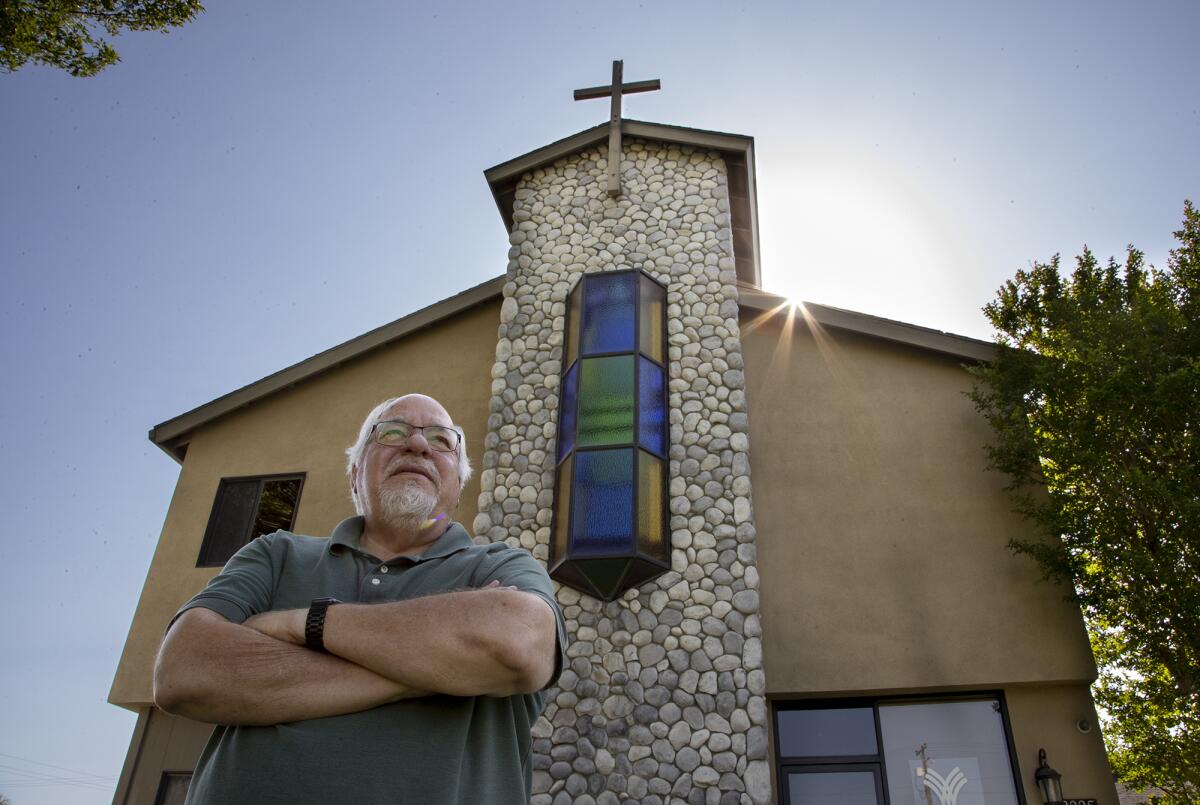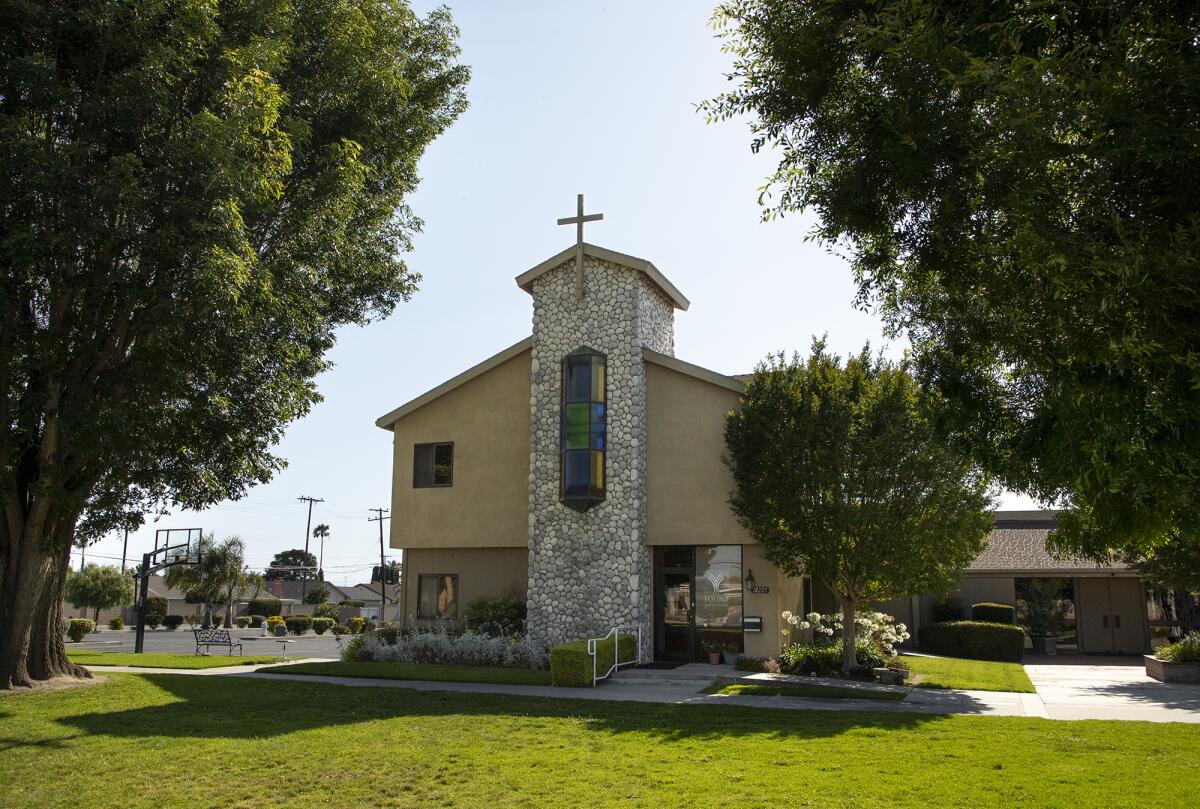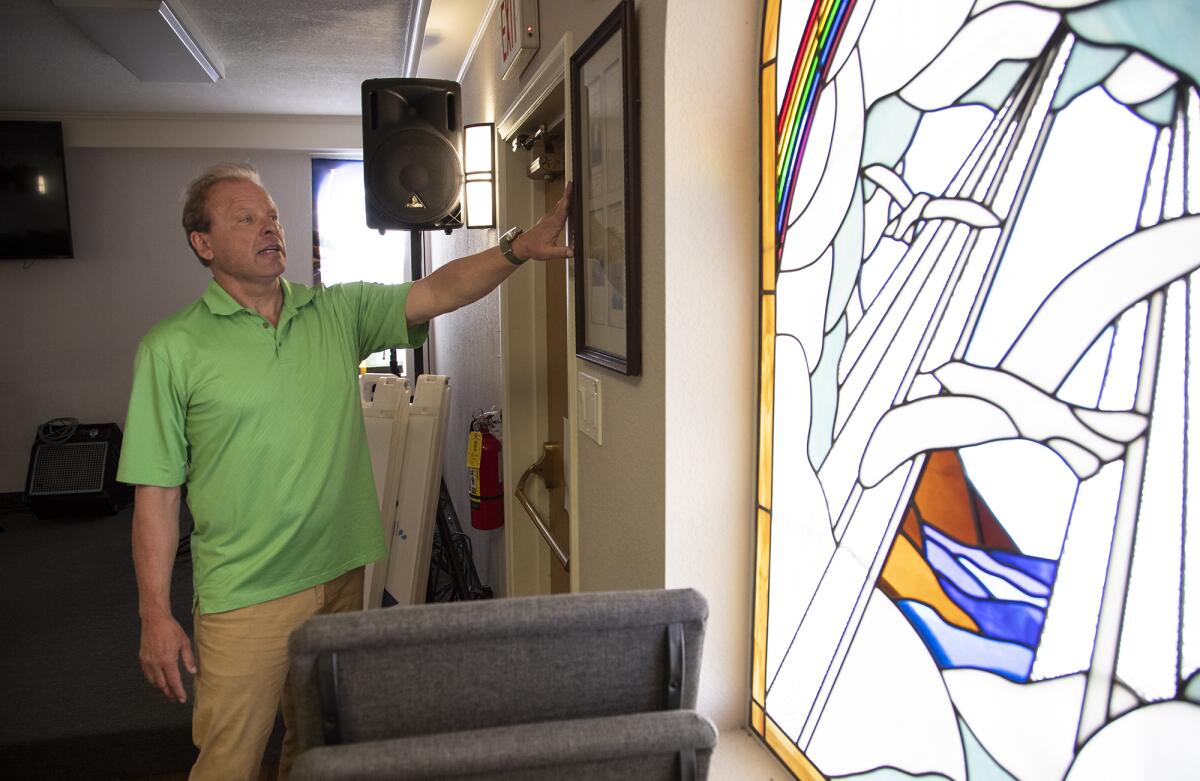United Methodist congregations trying to leave amid LGBTQ+ schism say they’re being held for ransom

- Share via
A number of Southern California churches whose congregations disagree with the California-Pacific Conference of the United Methodist Church’s inclusion of the LGBTQ+ community into its leadership want to leave the organization but say they’re being held for ransom.
There are 22 churches in the region attempting to cut ties with the denomination in a process called “disaffiliation.” Two Orange County churches, Surf City in Huntington Beach and the Fount in Fountain Valley, are among them.
The small congregation of the Fount began considering the option shortly after the Western Jurisdiction of the United Methodist Church, which the California-Pacific Conference is part of, proclaimed that their region was a “safe harbor” for clergy who identify as members of the LGBTQ+ community, said Glen Haworth, the Fount’s lead pastor.
“It’s the Bible that we disagree on,” Haworth said during an interview on June 19. “And the progressive end of the church wants to basically negate all of the teachings of the Bible that have to do with sexual morality.”

He said his congregation’s differences with the UMC lay in their fundamental understanding and interpretation of their faith, not just the conference’s acceptance of gay and lesbian pastors. That’s why the Fount’s members voted unanimously in October to disaffiliate.
In the past, that usually meant paying off pensions and any other outstanding dues before going on to either operate independently or join a different denomination, Haworth said. Those were the terms of a protocol drafted in 2019 among churches within the conference to allow conservative congregations to part ways.
But the leadership of the California-Pacific Conference has not allowed that deal to come to a vote, Haworth said. Instead, the organization has told the Fount and 21 other churches that to disaffiliate, they must pay half the value of their real estate. Otherwise the conference is claiming the authority to seize the property.
“My church has 50 members, and they want $3 million,” Haworth said. “And they say that’s fine, that’s fair. I say: fair to who?”
Conference leadership had revisited the arrangement posed to churches trying to leave but “ultimately decided to keep the terms the same,” the superintendent of the California-Pacific Conference’s South District, the Rev. Sandra Olewine, wrote in an email on June 23.
Haworth is hoping some other arrangement that may allow the Fount to survive can be worked out before the conference meets in November and votes on whether they will be allowed to disaffiliate. But he’s not optimistic. Meanwhile, Surf City Church wasn’t given an option.
Olewine said the church had been deemed “unviable” after “10 years of efforts to revitalize and focus the mission and ministry there.” As a result, conference leadership voted to close it.
The UMC superintendent added that Surf City Church did not raise the issue of disaffiliation until after its closure was approved, and members labeled unviable are not typically eligible for the separation process.
The church began distancing itself from UMC about 10 years ago as conflict was already brewing within the larger organization over its stance on LGBTQ+ issues, said John Leonard of the church’s board of trustees.
Then distrust grew after a stint by a recent pastor sent by the United Methodist Church. Olewine said pastor Amy Yoon attempted to create new programs and worked with members who had recently stepped into leadership roles.
COVID-19, lockdowns and a subsequent decline in attendance were a struggle for Yoon and the local church to overcome, Olewine said. Those factors created an impossible financial situation, resulting in conference officials’ decision.
But Leonard and fellow board member Marge Mitchell said that, during Yoon’s stint at Surf City, a popular men’s choir and various committees were disbanded. Membership started rapidly shrinking even before the pandemic hit, said David Housholder, lead pastor of the Well, a nondenominational congregation that rents part of Surf City Church to conduct worship.
Housholder, Leonard, Mitchell and Haworth claimed the goal of placing Yoon at the congregation was to undermine Surf City Church.
“I think the conference and the district have been looking at this property for some time,” Haworth said. “They’re thinking: ‘If a church gets weak, we can take it over and sell it.’”
Olewine said that amid the internal divide over the United Methodist Church’s stance on LGBTQ+ issues, along with the challenges of the pandemic, about 20% of its congregations have disaffiliated.
Funds generated by churches paying to leave the organization and the sale of Surf City Church’s campus are necessary to ensure that the conference can continue its mission, especially in communities where previous members have disaffiliated, the superintendent said. However, the crossroads the denomination finds itself at may also be a window to modernize.
“The issue of homosexuality and same-sex marriage is the presenting issue currently,” Olewine wrote. “But there are other challenges we must face [including] systemic racism, persistent sexism, and impacts of colonialism. ... We are amid a period of reformation, which is not a bad thing, but it is a challenging thing.”

More to Read
Sign up for Essential California
The most important California stories and recommendations in your inbox every morning.
You may occasionally receive promotional content from the Los Angeles Times.











